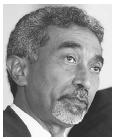EAST TIMOR
Mari Alkatiri
Prime Minister

(pronounced "MAH-ree Al-ka-TEE-ree")
"We have achieved the goal to free our homeland, and today we are a step closer to achieving political, economic and social freedom."
East Timor, also known as Timor Lorosa'e, became an independent nation in 2002. With a total area of 14,609 sq km (5,641 sq mi) and a population estimated in 2002 at 952,618, East Timor consists of the eastern half of Timor island, plus a small enclave, Oecussi, in West Timor. Indonesia is to the north and west, and Australia is to the south. Dili is the capital and largest city, with a population of approximately 67,000.
East Timor is about 92% Roman Catholic. The ethnic mixture includes Melanesian, Austronesian, and Malay ancestries. Tetum, widely spoken, and Portuguese are the official languages. There are 15 other indigenous languages, and English and Bahasa Indonesian are also in use. The literacy rate is 47%.
Some 49% of citizens subsist below the poverty line, and per capita annual income is US $300. Exports from East Timor include coffee, cloves, and coconuts. There is considerable potential revenue from petroleum reserves and seafood exports. Trading partners include Indonesia, Australia, and the United States. The U.S. dollar has been designated as the official currency.
ADDRESS
Office of the Prime Minister
Dili, Timor Lorosa'e (East Timor)
Comment about this article, ask questions, or add new information about this topic: